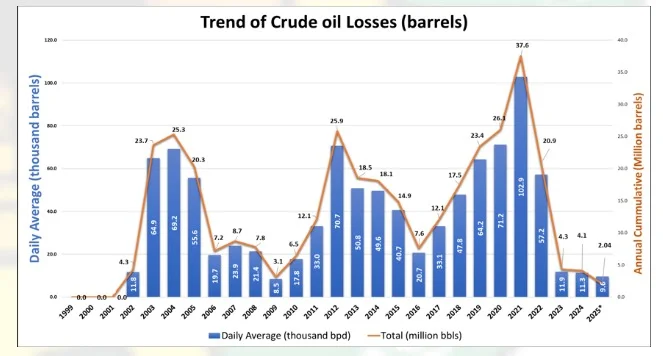The Nigerian Upstream Petroleum Regulatory Commission (NUPRC) says the country’s upstream oil sector is experiencing a significant turnaround.
It said Crude oil losses from theft and metering issues had fallen to their lowest levels in nearly 16 years.
According to the Commission, daily losses in July stood at 9,600 barrels per day (bpd)—the lowest recorded figure since 2009, when losses dropped to an all-time low of 8,500 bpd.
This data was based on year-to-date crude oil loss trends up to July, released by the NUPRC and shared by Eniola Akinkuotu, Head of Media and Strategic Communications on Thursday in Abuja.
The Commission described the progress as a major milestone in its ongoing efforts to eliminate crude losses across Nigeria’s oilfields and pipeline infrastructure.

Between January and July, total crude losses were contained at 2.04 million barrels, averaging 9,600 bpd over the seven-month period, the NUPRC added.
“This marks a clear departure from the high-loss years that have long plagued the industry.
“By comparison, the entire 2024 calendar year recorded 4.1 million barrels lost at a daily average of 11,300 barrels.
“Remarkably, in just the first seven months of 2025, losses were cut by 50.2 per cent, with only 2.04 million barrels lost over the period.
“The figures for the period ending July 2025 also represent a dramatic 94.57 per cent drop in crude oil losses.
“This is compared to the full year of 2021, when Nigeria lost a staggering 37.6 million barrels at a daily average of 102,900 barrels,” it said.
It said so far in 2025, only 2.04 million barrels have been lost, which was a reduction of 35.56 million barrels compared to the 37.6 million barrels lost in 2021, underscoring the scale of progress made in just four years.
It said that crude oil losses in 2021 were the highest recorded in nearly 23 years, making it the peak year between 2002 and July 2025.
“Since the implementation of the Petroleum Industry Act in 2021, Nigeria has recorded steady progress in reducing crude oil losses.
“In 2021, losses stood at 37.6 million barrels, averaging 102,900 barrels per day.
“By 2022, this dropped to 20.9 million barrels at a daily average of 57,200 barrels.
“The downward trend continued in 2023, with losses reduced to 4.3 million barrels at 11,900 barrels per day.
“Even more progress was made in 2024, as losses were further contained to 4.1 million barrels, averaging 11,300 barrels per day,” it said.
The commission said it had adopted a balanced mix of kinetic and non-kinetic strategies in tackling oil losses.
On the kinetic front, the commission said it continued to collaborate closely with security agencies, operators and communities, while on the non-kinetic front, it implemented strategic regulatory measures to close systemic loopholes.
“One key initiative is the metering audit across upstream facilities to ensure accurate measurement of production and exports.
“To further strengthen control, the NUPRC under the leadership of Mr Gbenga Komolafe approved 37 new crude oil evacuation routes to combat oil theft,” it said.

